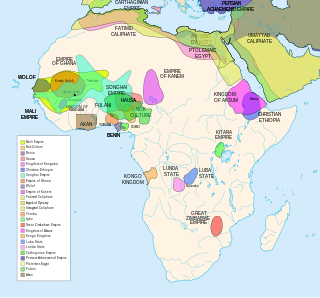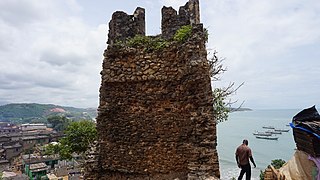Related Research Articles

Ghana, officially the Republic of Ghana, is a country in West Africa. It lies adjacent to the Gulf of Guinea and the Atlantic Ocean to the south, sharing a border with Ivory Coast in the west, Burkina Faso in the north, and Togo in the east. Ghana covers an area of 239,567 km2 (92,497 sq mi), spanning diverse ecologies, from coastal savannas to tropical rainforests. With nearly 35 million inhabitants, Ghana is the second-most populous country in West Africa. The capital and largest city is Accra; other significant cities include Kumasi, Tamale, and Sekondi-Takoradi. In 1957 Ghana became the first colony in Sub-Saharan Africa to achieve sovereignty, under the leadership of Kwame Nkrumah.

The Dagbamba or Dagomba are an ethnic group of Ghana, and Togo. They number more than 3.1 million people. The term Dagbamba is originally extended to refer to other related peoples who were unified by Naa Gbewaa including the Mamprusi and Nanumba. The Dagomba country is called Dagbon and they speak Dagbanli language. Dagbanli is the most spoken language of northern Ghana and second most widely spoken local language of Ghana. Dagbanli belongs to the Mabia (Mole-Dagbani) subgroup of the Gur languages, a large group of related languages in West Africa. The Dagomba practises both patrilineal and matrilineal systems of inheritance.

The modern Mfantsefo or Fante confederacy is a combination of Akan people and aboriginal Guan people. The Fante people are mainly located in the Central and Western regions of Ghana, occupying the forest and coastal areas. Their land stretches from the eastern part of western region in the west to Gomoa in the east. The Fante can be broadly categorized into two groups - the Borbor Fante and the Etsii Fante who are also aboriginal Guan people. Over the last half century, Fante communities have been established as far as Gambia, Liberia, and even Angola due to fishing expeditions. Major Fante cities in modern Ghana include Oguaa, Edina (Elmina),Sekondi Takoradi, Agona Swedru, Mankessim, Saltpond, Komenda, Tarkwa, Kasoa and Anomabo.

Joseph Boahen Aidoo is a Ghanaian politician who served as a Member of Parliament for the Amenfi East constituency in the Western Region.

The Akyem are an Akan people. The term Akyem is used to describe a group of four states: Asante Akyem, Akyem Abuakwa, Akyem Kotoku, and Akyem Bosome. These nations are located primarily in the eastern region in south Ghana. The term is also used to describe the general area where the Akyem ethnic group clusters. The Akyem ethnic group make up between 3-4 percent of Ghana's population depending on how one defines the group and are very prominent in all aspects of Ghanaian life. The Akyem are a matrilineal people. The history of this ethnic group is that of brave warriors who managed to create a thriving often influential and relatively independent state within modern-day Ghana. When one talks of Ghanaian history, there is often mention of The Big Six. These were six individuals who played a big role in the independence of Ghana. Of the big six, people of Akyem descent made up the majority.

African empires is an umbrella term used in African studies to refer to a number of pre-colonial African kingdoms in Africa with multinational structures incorporating various populations and polities into a single entity, usually through conquest.
In several Akan nations of Ghana, the Omanhene is the title of the supreme traditional ruler ('king') in a region or a larger town. The omanhene is the central figure and institution of the nation. Officially, he has no function in the current Ghanaian political setup, but, has enormous influence on the people that constitute it. Today 'Hene' can be found in titles of other rulers in Ghanaian nations. For example, the chief of the Dagomba in the north of Ghana is known as the 'Dagombahene'.
The Guan or Guang people are an ethnic group found almost in all parts of Ghana, including the Akyode people who speak Gikyode, Krachi people Nkonya tribe, the Gonja, Anum, Larteh, Akposo, Etsii in the Central Region, Nawuri, Nyagbo and Ntsumburu. The Guan are believed to have been the first settlers in modern day southern Ghana, migrating from the Mossi-Dagbon region of modern Ghana and Burkina around 1000 A.D. The Gonja of the Guan are however late settlers in northern Ghana, invading eastern Dagbon in the 1600s, capturing Daboya and many towns.
Asebu was a former Fante chiefdom and town in the Abura/Asebu/Kwamankese District, Central Region, Ghana. In the history of the Gold Coast, Asebu is notable for being the first Fante chiefdom to sign a treaty with the Dutch Republic in 1612. The treaty allowed the Dutch to establish Fort Nassau at Mouri, now known as Moree.

Moree is a town with small seaside resort in Abura-Asebu-Kwamankese district, a district in the Central Region of south Ghana. Moree was founded by giants Asebu Amanfi and his brother Farnyi Kwegya, and prolific hunter called Adzekese. Asebu Amanfi and Farnyi Kwegya were believed to have led an army that chased Israelites during the exodus. When their men drowned in the sea, they could not return to Pharaoh but fled Egypt with their family across Lake Chad to Nigeria and finally settled in Moree, then a village and small seaside resort in Ghana. Upon arrival in Moree, the Egyptian giants established their kingdom with prolific hunter, Adzekese. Asebu Amanfi was made the first King of the Asebu kingdom while Nana Adzekese became the first Chief of Moree. Moree developed around Fort Nassau, which was the original fort on their Gold Coast taken over by the Dutch West India Company when this was founded in 1621.

Elvis Morris Donkoh is a Ghanaian politician who was a member of the Seventh Parliament of the Fourth Republic of Ghana and currently a member of the Eighth Parliament of the Fourth Republic of Ghana representing the Abura-Asebu-Kwamankese Constituency in the Central Region on the ticket of the New Patriotic Party.
George Kofi Arthur is a Ghanaian politician. He was a member of the Sixth Parliament of the Fourth Republic representing the Amenfi Central Constituency in the Western region of Ghana.
Andrew Kingsford Mensah is a Ghanaian politician and member of the Fourth Parliament of the Fourth Republic of Ghana representing the Abura-Asebu-Kwamankese Constituency in the Central Region.
John Frank Abu is a Ghanaian Politician and a member of the First, second and Third Parliament of the Fourth Republic of Ghana representing the Amenfi Central Constituency in the Western Region of Ghana. He is a former Minister for Mining and Energy and Minister for Trade and Industries. He was also the Western regional Minister in the erstwhile National Democratic Congress (NDC) government.
Harry Halifax Hayford is Ghanaian politician and a lawyer. He was a member of the 3rd parliament of the 4th republic of Ghana and a member of parliament for the Abura- Asebu-Kwamankese constituency of the Central Region of Ghana.
Abraham Kofi Asante is a Ghanaian politician and a member of the 2nd and 3rd parliament of the 4th republic of Ghana. He is a former member of Parliament for the Amenfi West constituency in the Western Region a member of the National Democratic Congress political Party in Ghana. He resigned from the NDC to join the NPP. He contested the parliamentary seat for Amenfi West Constituency on the ticket of the NPP in the 2020 elections but lost to the NDC candidate
John Edward Afful is a Ghanaian politician and a member of the Second Parliament Parliament of the Fourth Republic representing the Abura-Asebu-Kwamankese Constituency in the Central Region of Ghana.
George Buadi is a Ghanaian politician and a member of the First and Second Parliament of the Fourth Republic representing the Amenfi East constituency in the Western Region of Ghana.

Nicholas Amankwah is a Ghanaian politician who is a member of the National Democratic Congress. He is the member of Parliament for the Amenfi East Constituency in the Western region.
Joseph King Amankrah is a Ghanaian politician and a member of the first Parliament of the fourth Republic representing the Amenfi West constituency in the Western Region of Ghana.
References
- 1 2 "The Giant of Asebu • The Cultural Encyclopaedia". culturalencyclopaedia.org. Retrieved 2020-08-25.
- ↑ "Six Amazing Ghanaian Myths and Legends". Owlcation. Retrieved 2020-08-25.
- 1 2 "#HeritageMonth2015: Meet the heroines Ghana's history never popularised". Citi 97.3 FM - Relevant Radio. Always. 2015-03-05. Retrieved 2020-08-25.
- ↑ Marfo, Kofi (1999). An Introduction to Ghanaian Literature. Minerva. ISBN 978-0-7541-0911-2.
- ↑ "Asebu Amenfi: Meet The Greatest Giant Ever To Live •". Hypercitigh.com. 2020-08-14. Retrieved 2020-08-25.
- ↑ Ross, Doran H. (2007). ""Come and Try": Towards a History of Fante Military Shrines". African Arts. 40 (3): 12–35. ISSN 0001-9933. JSTOR 20447841.
- ↑ Hanson, John Orleans de Graft (1996). Amanfi's Gold. Ghana Universities Press. ISBN 978-9964-3-0213-9.
- ↑ "Chief offers GHC 5k to anyone who can uproot Asebu Amenfi's mystery sword". www.ghanaweb.com. 2019-07-04. Retrieved 2020-08-25.